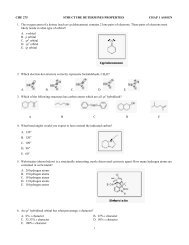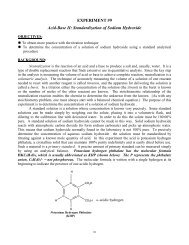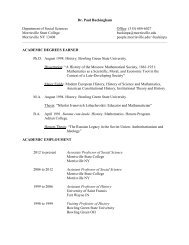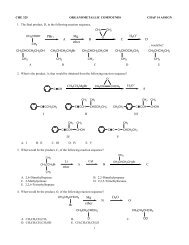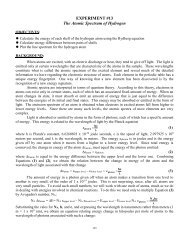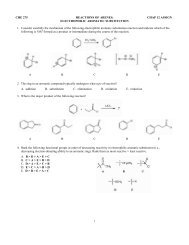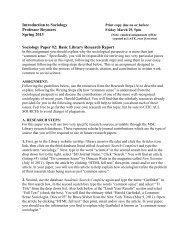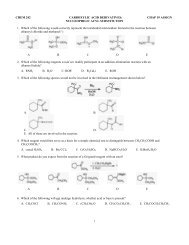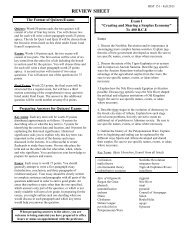Some Principles of Stratification - Theories of Social Differentiation ...
Some Principles of Stratification - Theories of Social Differentiation ...
Some Principles of Stratification - Theories of Social Differentiation ...
You also want an ePaper? Increase the reach of your titles
YUMPU automatically turns print PDFs into web optimized ePapers that Google loves.
SOME PRINCIPLES OF STRATIFICATION 393<br />
tasks conscientiously. While such a tradition<br />
seems utterly utopian, no known facts<br />
in psychological or social science have yet<br />
demonstrated its impossibility or its dysfunctionality<br />
for the continuity <strong>of</strong> a society.<br />
The achievement <strong>of</strong> a full institutionalization<br />
<strong>of</strong> such a tradition seems far too<br />
remote to contemplate. <strong>Some</strong> successive approximations<br />
at such a tradition, however,<br />
are not out <strong>of</strong> the range <strong>of</strong> prospective social<br />
innovation.<br />
What, then, <strong>of</strong> the "positive functionality"<br />
<strong>of</strong> social stratification Are there<br />
other, negative, functions <strong>of</strong> institutionalized<br />
social inequality which can be identified, if<br />
only tentatively <strong>Some</strong> such dysfunctions <strong>of</strong><br />
stratification have already been suggested in<br />
the body <strong>of</strong> this paper. Along with others<br />
they may now be stated, in the form <strong>of</strong><br />
provisional assertions, as follows:<br />
(1) <strong>Social</strong> stratification systems function<br />
to limit the possibility <strong>of</strong> discovery <strong>of</strong> the<br />
full range <strong>of</strong> talent available in a society.<br />
This results from the fact <strong>of</strong> unequal access<br />
to appropriate motivation, channels <strong>of</strong> recruitment<br />
and centers <strong>of</strong> training.<br />
(2) In foreshortening the range <strong>of</strong> avail-<br />
able talent, social stratification systems function<br />
to set limits upon the possibility <strong>of</strong><br />
expanding the productive resources <strong>of</strong> the<br />
society, at least relative to what might be<br />
the case under conditions <strong>of</strong> greater equality<br />
<strong>of</strong> opportunity.<br />
(3) <strong>Social</strong> stratification systems function<br />
to provide the elite with the political power<br />
necessary to procure acceptance and dominance<br />
<strong>of</strong> an ideology which rationalizes the<br />
status quo, whatever it may be, as "logical,"<br />
"natural" and "morally right." In this manner,<br />
social stratification systems function as<br />
essentially conservative influences in the societies<br />
in which they are found.<br />
(4) <strong>Social</strong> stratification systems function<br />
to distribute favorable self-images unequally<br />
throughout a population. To the extent that<br />
such favorable self-images are requisite to<br />
the development <strong>of</strong> the creative potential inherent<br />
in men, to that extent stratification<br />
systems function to limit the development <strong>of</strong><br />
this creative potential.<br />
(5) To the extent that inequalities in social<br />
rewards cannot be made fully acceptable<br />
to the less privileged in a society, social<br />
stratification systems function to encourage<br />
hostility, suspicion and distrust among the<br />
various segments <strong>of</strong> a society and thus to<br />
limit the possibilities <strong>of</strong> extensive social<br />
integration.<br />
(6) To the extent that the sense <strong>of</strong> significant<br />
membership in a society depends on<br />
one's place on the prestige ladder <strong>of</strong> the<br />
society, social stratification systems function<br />
to distribute unequally the sense <strong>of</strong> significant<br />
membership in the population.<br />
(7) To the extent that loyalty to a society<br />
depends on a sense <strong>of</strong> significant membership<br />
in the society, social stratification systems<br />
function to distribute loyalty unequally in the<br />
population.<br />
(8) To the extent that participation and<br />
apathy depend upon the sense <strong>of</strong> significant<br />
membership in the society, social stratification<br />
systems function to distribute the<br />
motivation to participate unequally in a<br />
population.<br />
Each <strong>of</strong> the eight foregoing propositions<br />
contains implicit hypotheses regarding the<br />
consequences <strong>of</strong> unequal distribution <strong>of</strong> rewards<br />
in a society in accordance with some<br />
notion <strong>of</strong> the functional importance <strong>of</strong> various<br />
positions. These are empirical hypotheses,<br />
subject to test. They are <strong>of</strong>fered here<br />
only as exemplary <strong>of</strong> the kinds <strong>of</strong> consequences<br />
<strong>of</strong> social stratification which are<br />
not <strong>of</strong>ten taken into account in dealing with<br />
the problem. They should also serve to reinforce<br />
the doubt that social inequality is<br />
a device which is uniformly functional for<br />
the role <strong>of</strong> guaranteeing that the most<br />
important tasks in a society will be performed<br />
conscientiously by the most competent<br />
persons.<br />
The obviously mixed character <strong>of</strong> the<br />
functions <strong>of</strong> social inequality should come<br />
as no surprise to anyone. If sociology is<br />
sophisticated in any sense, it is certainly<br />
with regard to its awareness <strong>of</strong> the mixed<br />
nature <strong>of</strong> any social arrangement, when the<br />
observer takes into account long as well as<br />
short range consequences and latent as well<br />
as manifest dimensions.<br />
SUMMARY<br />
In this paper, an effort has been made<br />
to raise questions regarding the inevitability<br />
and positive functionality <strong>of</strong> stratification,<br />
or institutionalized social inequality in rewards,<br />
allocated in accordance with some<br />
notion <strong>of</strong> the greater and lesser functional<br />
importance <strong>of</strong> various positions. The possible<br />
alternative meanings <strong>of</strong> the concept<br />
"functional importance" has been shown to<br />
be one difficulty. The question <strong>of</strong> the



